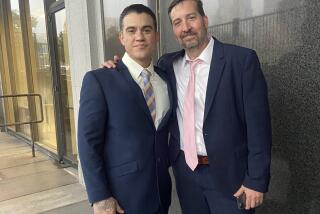2 Guilty of Killing Transgender Teen
- Share via
A Bay Area jury on Monday convicted two men of second-degree murder for killing transgender teenager Gwen Araujo at a party in October 2002 after they accused the 17-year-old of deceiving them into believing she was biologically female.
Michael Magidson and Jose Merel, both 25, face mandatory sentences of 15 years to life in prison, but were cleared of hate-crime charges in the killing.
Alameda County Superior Court Judge Harry R. Sheppard declared a mistrial for a third man, Jason Cazares, after the jury announced it was deadlocked -- the second time a jury was unable to reach a verdict involving the 25-year-old.
Jaron Nabors, a fourth defendant who was also present the night Araujo died, previously pleaded guilty to manslaughter in exchange for testifying against the others.
When the verdicts were read about 3 p.m., Araujo’s 22-year-old sister sobbed, said the victim’s mother, Sylvia Guerrero, who squeezed her daughter’s hand.
“I was a little surprised, but I felt good,” she said later. “Two second-degree murder convictions, what more can you ask for? Nothing is going to bring Gwen back.”
Attorneys for the three defendants could not be reached Monday.
But transgender advocates hailed Monday’s verdicts. “This is a huge step in finding closure for the family and friends of Gwen Araujo,” said Christopher Daley, director of the Transgender Law Center in San Francisco. Others said the verdicts were unsatisfactory.
“Only some justice has been done,” said Thom Lynch, executive director of the San Francisco Lesbian Gay Bisexual Transgender Community Center. “The idea that hate was not a factor and that one person still walks free is just unimaginable.”
Lynch said the jury had an opportunity to send a message that this kind of activity would not be tolerated.
“Unfortunately,” he said, “that message did not get sent.”
In the early hours of Oct. 4, 2002, after a night of heavy drinking, Magidson, Cazares and Merel confronted Araujo about her true biological identification, according to court testimony. Magidson and Merel had previously had sex with the teen.
Araujo, who lived as a girl and assumed the name of her favorite pop singer, Gwen Stefani, was attacked inside a dingy tract house in Newark, on the southern end of San Francisco Bay.
The victim was kicked and beaten with a soup can and an iron skillet, bludgeoned with a shovel and choked with a rope. Just before dawn, the three suspects allegedly buried Araujo near a secluded campsite in the Sierra foothills before ordering breakfast at a nearby McDonald’s.
The first trial of the men, who often called themselves “the Three Stooges,” ended in 2003 with the jury deadlocked on the charges.
Since her death, Araujo has taken on symbolic status in California’s transgender community. Both trials, held in suburban Hayward, were often attended by transgender activists, who circulated details via e-mails and websites.
The day after the first trial ended, Guerrero legally changed her deceased child’s name from Edward Araujo Jr. to Gwen Amber Rose Araujo.
In the second trial, which began in June, Cazares testified that he was outside the house when the killing took place and only helped bury the body. Merel’s attorney said he was not guilty of anything more than felony assault.
Alameda County Deputy Dist. Atty. Chris Lamiero said Monday that the jury -- which deliberated for seven days -- did not buy the arguments. “I think the jury, by returning two verdicts of guilty for murder, clearly rejected the defense that this was manslaughter. I’m very pleased with that,” he said.
He said jurors were divided 9 to 3 for convicting Cazares as well: “It’s disappointing not to have a unanimous verdict on him as well, but I know the jury tried to work out their differences.”
Lamiero said he has not decided whether to retry Cazares. But if there is another trial, Guerrero said that she will be there.
“I’ll sit through 20 retrials,” she said. “That’s how much we loved Gwen. I’ll continue until there’s justice.”
More to Read
Sign up for Essential California
The most important California stories and recommendations in your inbox every morning.
You may occasionally receive promotional content from the Los Angeles Times.











